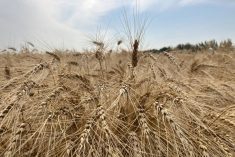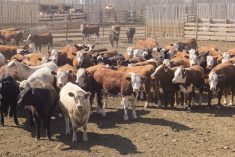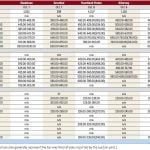Action to fix the E. coli controls at one of Canada’s biggest beef packing plants hasn’t come quick enough for Canada’s federal food safety watchdogs.
The Canadian Food Inspection Agency announced late Thursday it has “temporarily suspended” the operating license for federal Establishment 38, otherwise known as XL Foods’ Lakeside Packers plant at Brooks, Alta.
“XL Foods Inc. will not resume operations until they have demonstrated that they have fully implemented CFIA’s required corrective actions,” the agency said in a release.
The Brooks plant “is an important purchaser of cattle in the Canadian market, and with their absence as a processor, we expect to see a temporary impact in the live cattle market as a result of this action,” the Canadian Cattlemen’s Association warned producers in a separate statement Friday.
Read Also

U.S. livestock: Feeder cattle hit contract highs on tight supply
Chicago | Reuters – All Chicago Mercantile Exchange feeder cattle futures and most live cattle futures hit contract highs on…
“However, as Canadian and U.S. cattle supplies are currently quite low, there is ample processing capacity and cattle demand at other facilities in Canada and the U.S. to process animals that would have gone to Establishment 38,” the CCA said.
Thus, “we would expect the price impact on cattle to be minimal and for a short period of time.”
Essentially, the CCA said, CFIA’s move “should isolate Establishment 38 while they implement their response plan and CFIA monitors their corrective actions.”
The shutdown, CCA said, should also help reassure consumers of beef’s safety and ensure “beef produced at other facilities is not perceived negatively by association.”
The agency’s moves follows weeks of product recalls from the Lakeside plant, dating back to Sept. 4 when CFIA first confirmed E. coli O157:H7 in products from an Alberta plant using Lakeside beef.
The agency got a report from the U.S. Department of Agriculture that same day of an O157:H7-positive sample in beef trimmings from the Lakeside plant, CFIA said. The agency on Sept. 13 de-listed Establishment 38 for export to the U.S., at USDA’s request.
Many strains of E. coli bacteria are found in animals’ intestines, but O157:H7 is one of a small number that can produce toxins causing serious illness in people.
A substantial amount of beef product that originated from the Lakeside line on Aug. 24, 27, 28 and 29 and Sept. 5 has been recalled, and XL has since expanded its recall of raw meats produced at the plant on those dates.
CFIA said it will continue to “immediately alert” consumers as “additional products” are identified. That means beef consumers can expect a “series of recall announcements over the next few days” as more products are identified and traced.
“Too important”
CFIA said its investigation at Brooks “did not identify one single factor that would lead to E. coli O157:H7 contamination” but rather, “the combination of several deficiencies,” each of which by itself would not have been a red flag in a normal day’s inspection work.
Slaughter plants are expected to have “adequate measures” in place to monitor higher-than-normal detection rates for E. coli, and to adjust those control measures. However, CFIA said, “this trend analysis was not always conducted consistently” at Lakeside.
CFIA said it has also caught “deviations from the company’s documented E. coli O157:H7 control measures and sampling and testing procedures.” Further, it said, it found XL “unable to demonstrate through its documentation that it was consistently and effectively implementing its agreed-upon control program.”
XL had said in a separate release Wednesday that it was “progressing swiftly with the implementation of enhanced trend analysis and documentation processes” as per CFIA’s findings.
CFIA said Thursday, however, that based on information from XL on Wednesday, and on CFIA inspector oversight, the agency “has determined that these deficiencies have not been completely corrected.”
Furthermore, CFIA said Thursday, the company “has not adequately implemented agreed-upon corrective actions and has not presented acceptable plans to address longer-term issues.”
XL had said Wednesday that it “has developed and initiated a response plan that exceeds industry standards and has been accepted by CFIA.” The company on Wednesday quoted the agency as saying it has “accepted the company’s plan and will monitor corrective actions to verify that they have been implemented effectively.”
XL also said Wednesday it “has implemented increased documentation processes to comply with CFIA requests.”
“We will continue to act in (customers’) best interests throughout the completion of the recall, investigation into source of contamination and implementation of enhanced systems to ensure something like this never happens again,” XL said Wednesday.
“Food safety is simply too important to our customers, our employees and our business.”
XL, owned by Edmonton-based Nilsson Bros., bought the Lakeside plant in 2009 from U.S. meat giant Tyson Foods.
Related stories:
Illnesses lead to warning over Edmonton store’s steaks, Sept. 27, 2012
Silence isn’t golden when it comes to meat safety (blog), Sept. 26, 2012
U.S. bans Alta. plant’s beef on E. coli findings, Sept. 25, 2012

















